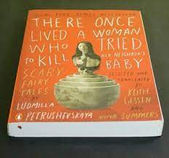There Once Lived a Woman Who Tried to Kill her Neighbors’ Baby
Author
The New York Times Bestseller
Amazon Bestseller in translated fiction
Full English, French, German translations available
A master of the short story genre, heir to the spellbinding tradition of Poe and Gogol, Ludmilla Petrushevskaya dazzles the imagination with explorations of death, love, space, time and identity. This is an invitation to travel along a “shadowy borderland between reality and nightmare, one not to resist.
In her mystical scary stories that at once recall Kafka, Borges and Gogol, Petrushevskaya pictures the deprived and desperate – orphans, childless women, lonely elderly people – in search of love and happiness, in their struggle for life. The fantastic (magical transformations, resurrection of the dead, living dolls and magical objects) merges here into reality, authentically captured by the author. Petrushevskaya’s signature prose, harrowing and painfully sensitive, seems to strip off your skin, making your naked nerves shudder at the touch of this fictional reality that is much too close for comfort.
Here is a childless woman who grows a girl in a cabbage (The Cabbage-Patch Mother), or a girl attempts suicide and finds herself in a horrid, unlit apartment building chased by monstrous lorry drivers, escaping a split second before it is too late to come back to life (A Black Coat). There are frighteningly prophetic stories on pandemic extreme aftermath (Hygiene, The New Family Robinson).
Set against a bleak background, Petrushevskaya’s “fairy-tales for grownups, as the author defines the genre, are amazingly dynamic and ingenious.
Every one of the 19 stories in Petrushevskaya’s There Once Lived a Woman Who Tried to Kill Her Neighbor’s Baby presents an arresting parable of this kind. Timeless and troubling, these “scary fairy tales grapple with accidents of fate and weaknesses of human nature that exact a heavy penance. Short, highly concentrated, inventive and disturbing, her tales inhabit a borderline between this world and the next, a place where vengeance and grace may be achieved only in dreams.
— New York Times Review of Books
Simply put, these stories are incredibly weird. But they linger in the mind as unsolvable puzzles: mysterious and undeniably seductive.
— More magazine
These stories work the boundary states of consciousness – between sleep and waking, hallucination and realization, life and death – like a tongue works an aching tooth. You never know where you are or where you’re going, because the ground beneath the narratives is constantly shifting. You know only that the world you are in is as bleak as Beckett, as astringent as witch hazel, as poetic as your finest private passing moments.
— Elle magazine
Arresting.. Incantatory... Timeless and troubling... This exquisite collection [is] vital, eerie and freighted with the moral messages that attend all cautionary tales...[Petrushevskaya] is hailed as one of Russia's best living writers. This slim volume shows why. Again and again, in surprisingly few words, her witchy magic foments an unsettling brew of conscience and consequences.
— The New York Times
The book could catch fire in your hands and you'd still try to be turning pages. It's giving me nightmares, in the nicest way possible.
— Bookslut
Thrillingly strange... Brilliantly disturbing... The fact that Ludmilla Petrushevskaya is Russia's premier writer of fiction today proves that the literary tradition that produced Dostoyevsky, Gogol, and Babel is alive and well.
— The Daily Beast
What distinguishes the author is her compression of language, her use of detail and her powerful visual sense... Petrushevskaya is certainly a writer of particular gifts. — Time Out New York
Book details
Penguin Books
English language edition
Short stories, 2009
224 pp
Russian editions
AST, 2011; Alpina Prose, 2022
Rights sold
World English Penguin
German Bloomsbury Berlin
French Christian Bourgois
Spanish Atalanta
Italian Einaudi
Portuguese (Brazil) Companhia das Lettras
Norwegian Cappelen Damm
Danish Vandkunsten
Chinese simplified characters Shanghai 99 Culture Consulting
Romanian Meteor Press
Estonian Tänapäev
Turkish Jaguar
Japanese Kawade Shobo Shinsha
Serbian Solaris
Korean Sigongsa
Czech Větrné mlýny
Macedonian Ili Ili
Hungarian Typotex
Armenian Vogi Nairi
Dutch De Geus
Bulgarian Prozorets
Albanian Ombra
Malayalam (India) Saikatham
Croatian Hangar 7
Literary awards
The New York Times Bestseller
The World Fantasy Award 2010
One of New York magazine’s 10 Best Books of the Year 2009
One of NPR’s 5 Best Works of Foreign Fiction 2009











